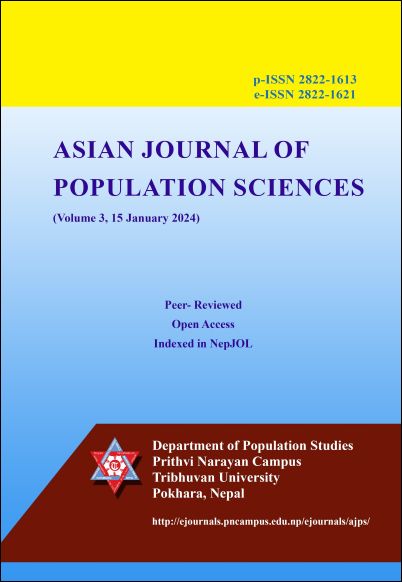Retaining the returnee migrant workers: Lessons learned from COVID-19
DOI:
https://doi.org/10.3126/ajps.v3i1.61838Keywords:
COVID, workers, jobs, remittance, priorityAbstract
This paper presents facts and figures of returnee migrant workers in Nepal during the COVID-19 crisis. Nepal, affected by the coronavirus pandemic late after the fourth week of March 2020, the government decided to lockdown due to the appearance of two incidences of infection crossed over one million. Using secondary sources of literature, the paper mainly analyses the facts and figures concerning the COVID-19 crisis and migrant workers' issues. During this period, a severe crisis affected the country with a 75 per cent fall in remittance from the already counted 25 per cent of total gross domestic product. In the beginning, around 1.5 million migrant workers were expected to return by losing jobs in major destinations - India, the Middle East and Malaysia - which is over one-fifth of the total migrant workers abroad. This rate of return however was not recorded to that number. The growing tension of the virus was not limited to the state level only but basically, the individuals losing jobs, killing hopes of getting involved in new jobs and remaining unattended by the state authorities for a longer time amid confusion and dilemma of policies and programmes. Those involved in the informal sectors, particularly the women and other marginalised communities were severely affected when they could not collect food for their families, pay back rents or survive in the place. Reducing the impact of the pandemic, all the stakeholders needed to resume their work by getting proper knowledge and information on the impact of COVID-19. It necessitated concentrating on the immediate priorities such as current living conditions and utilising best practices available and possible in the local communities for reintegration by adopting the tight of the migrant workers. Although the government announced packages to retain nearly one million returnees, this could not properly happen and with dismay, the returned migrants opted to work and jobs abroad.
Downloads
Downloads
Published
How to Cite
Issue
Section
License

This work is licensed under a Creative Commons Attribution-ShareAlike 4.0 International License.




